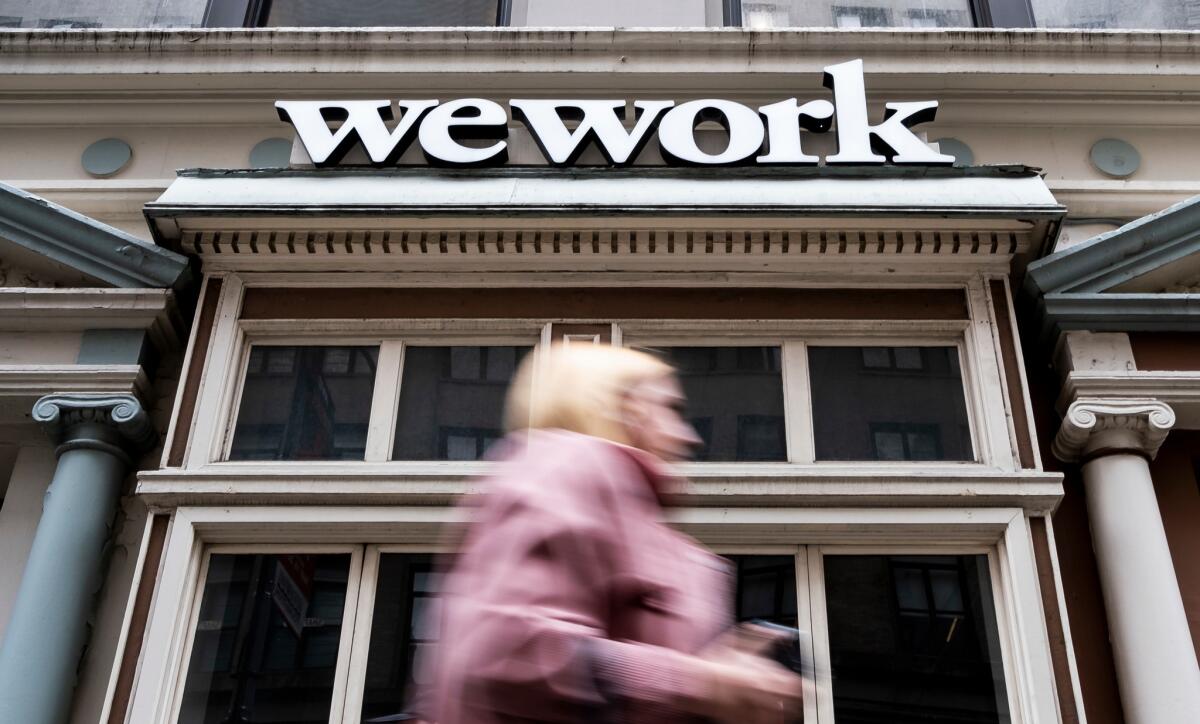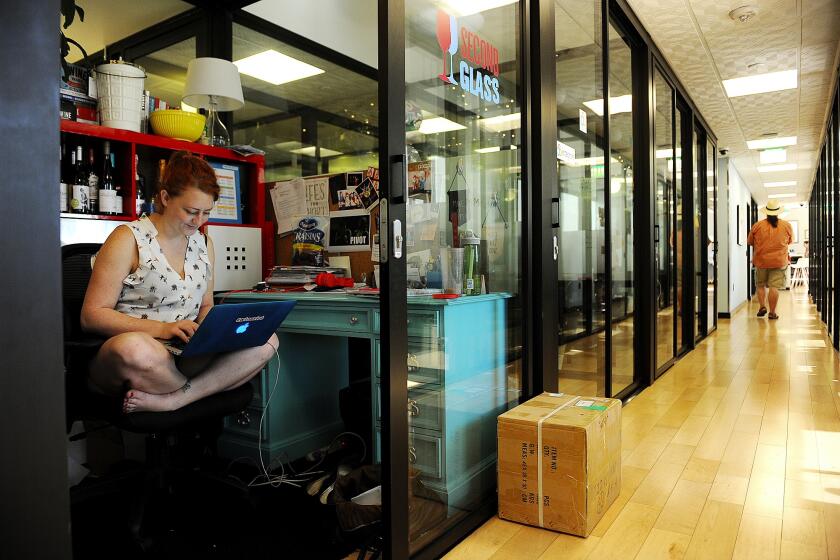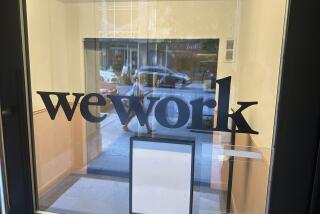WeWork makes a mad dash for cash as JPMorgan peddles risky debt

- Share via
Bankers who two months ago were fighting for a piece of WeWork’s highly anticipated share sale are now scrambling to just keep the company alive.
WeWork and its backers are furiously trying to line up two rescue plans before it runs out of cash as early as next month: one by SoftBank Group, the company’s largest shareholder, and one by JPMorgan Chase & Co., which won WeWork’s IPO mandate but ultimately didn’t pocket a fee as the plan for the initial public offering collapsed and cut off WeWork’s access to new cash.
JPMorgan is sharing its proposal — an unusually risky $5-billion debt package that is WeWork’s preferred option — with about 100 investors, according to a person with knowledge of the discussion. Several have expressed skepticism about WeWork’s ability to service the debt, and news of the proposal’s eye-popping terms sent the company’s existing bonds reeling to a new low Tuesday.
Nothing about WeWork looks normal, and Wall Street may finally be waking up
At the same time, SoftBank is trying to pull together a backup option. The Japanese investment powerhouse would inject capital into WeWork and take a controlling stake, a move the company’s management hopes to avoid. To help it craft a proposal, SoftBank hired advisors at investment bank Houlihan Lokey to explore options for easing WeWork’s cash crunch, said people with knowledge of the discussions.
Both proposals share one thing: a lot of uncertainty.
“WeWork’s credit metrics remain off-the-chart ugly,” Vicki Bryan, chief executive of Bond Angle, a high-yield credit research company, said in a note Tuesday.
JPMorgan’s plan would raise $5 billion in one of the riskiest junk debt offerings in recent years that could include $2 billion of pay-in-kind bonds yielding 15%. The bank is casting an unusually wide net for this type of offering, pitching investors ranging from some of the world’s largest asset managers to credit hedge funds with expertise in distressed investing, according to people familiar with the matter.
Payment-in-kind notes, known as PIKs in industry parlance, give issuers the option to pay interest on debt with more debt. In buying PIK deals, investors are in effect betting that a cash-strapped company will be able to make good on a ballooning debt obligation when it matures. PIK debt has historically been favored by the likes of struggling energy companies and firms exiting bankruptcy.
Entertainment, technology and co-working companies kept Los Angeles office landlords happy in the third quarter.
Although terms remain under discussion, the potential WeWork PIK could pay 5% interest in cash and 10% interest in debt that would accumulate and become due at maturity. That means that a $2-billion obligation with a 10% payment-in-kind option would grow to $2.7 billion after three years and $3.2 billion after five.
WeWork’s board has hired investment bank Perella Weinberg Partners as it weighs its options. With funds running low, the company expects to cut potentially thousands of jobs from its staff of about 12,500 this month, as it focuses on its core business of renting out office space.
Lending to WeWork is so potentially dicey that one junk bond investor, Diamond Hill Capital Management’s John McClain, said anybody brave enough to do it would “be taking on substantial career risk.”
The proposed yield in the new debt package underscores skepticism among debt investors that the company will be able to stem its cash bleed and become profitable anytime soon. It’s a costly option that may reward investors handsomely in the event of an actual turnaround.
For founders like WeWork’s Adam Neumann, gargantuan funding offered an opportunity — or an imperative — to double down on unproven and money-losing business models.
The market’s initial reaction wasn’t encouraging. WeWork’s existing notes, $669 million of 7.875% bonds due in 2025, fell the most on record Tuesday morning after Bloomberg reported on the potential terms for a new debt package. The junk bonds dropped to a record low of 79 cents on the dollar to yield 13.4%, according to Trace, before recovering a bit.
SoftBank’s advisors at Houlihan are working on cutting liabilities as WeWork mulls over the debt package. Other measures for restructuring WeWork’s balance sheet could include renegotiating or terminating some existing leases to reduce WeWork’s indebtedness and cash burn. Future lease payment obligations as of June 30 were $47.2 billion, according to the prospectus for WeWork’s aborted IPO.
The new debt could come with a coupon nearly twice that of the junk bonds the company sold less than 18 months ago.
“If they are talking about doing a PIK note at a yield of 15%, the existing unsecureds have to reprice,” McClain said.
More to Read
Inside the business of entertainment
The Wide Shot brings you news, analysis and insights on everything from streaming wars to production — and what it all means for the future.
You may occasionally receive promotional content from the Los Angeles Times.












